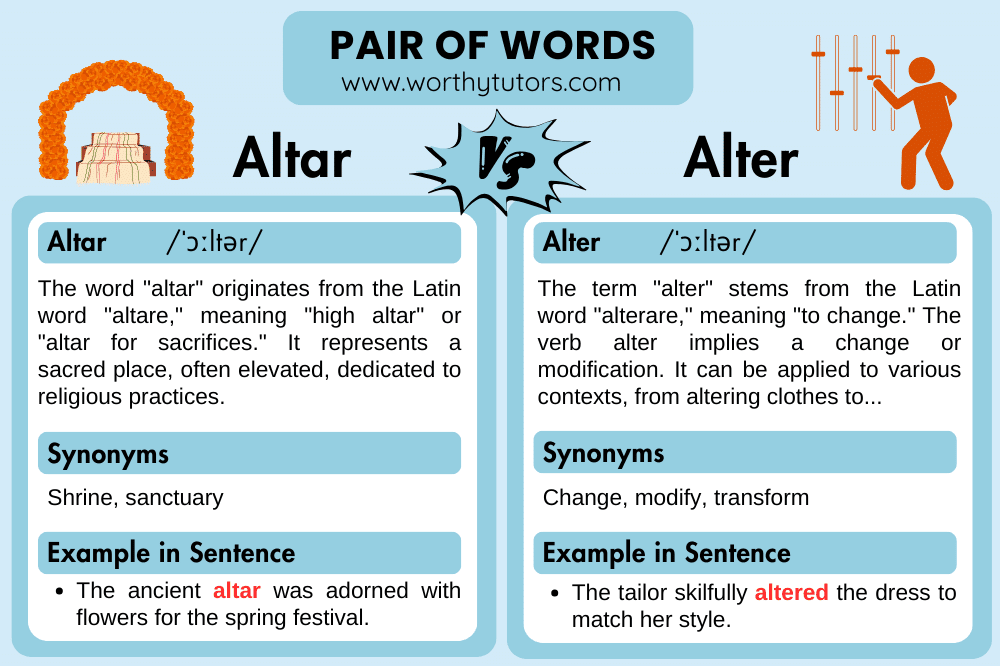
Know the Differences Between Altar and alter
Homophones in the English language are a fascinating phenomenon, where words sounding identical have different spellings and meanings. “Altar” and “alter” are two such words that are often mixed up despite their distinct meanings. This expanded article aims to provide a comprehensive understanding of these terms, enriched with more examples to illustrate their usage.
ALtar
Pronunciation:
The pronunciation of altar is /ˈɔːltər/.
Meaning of Altar
An “altar” is a raised structure typically found in religious settings, used for offerings, sacrifices, or ceremonial purposes.
Synonyms of Altar
- Shrine
- Sanctuary
- Sacred table
Explanation and Etymology of Altar
The word “altar” originates from the Latin word “altare,” meaning “high altar” or “altar for sacrifices.” It represents a sacred place, often elevated, dedicated to religious practices. It is a focal point in many spiritual ceremonies, symbolizing a space of worship and reverence.
Example in Sentences
- The ancient altar was adorned with flowers for the spring festival.
- They approached the altar with reverence, feeling the solemnity of the moment.
- In the temple, the altar stood as a testament to centuries of tradition.
- The couple stood before the altar, exchanging vows of eternal love.
- The priest stood before the altar, ready to officiate the wedding ceremony.
Alter
Pronunciation:
The pronunciation of alter is /ˈɔːltər/
Meaning of Alter
“Alter” is a verb that means to change or modify something, typically to make it different from its original state.
Synonyms of Alter
- Change
- Modify
- Adjust
Explanation and Etymology of Alter
The term “alter” stems from the Latin word “alterare,” meaning “to change.” The verb alter implies a change or modification. It can be applied to various contexts, from altering clothes to altering plans, indicating a degree of transformation or adjustment.
Example in Sentences
- To accommodate the growing audience, they had to alter the layout of the auditorium.
- He decided to alter his daily routine to include more exercise.
- The tailor skilfully altered the dress to match her style.
- The software update will alter the interface to improve user experience.
- She didn’t want to alter the original recipe, but she had no choice because of the dietary restrictions.
Summary
Understanding the distinctions between “altar” and “alter” ensures precise communication and prevents confusion in various contexts. While an altar holds religious significance, to alter something is to change or modify it according to one’s needs or preferences.
Student Exercise
- She offered prayers at the _____ before the start of the ceremony. (Altar/Alter)
- It’s important to _____ your behavior if you want to achieve different results. (Altar/Alter)
- The artist decided to _____ the painting to better express his vision. (Altar/Alter)
- The couple exchanged vows at the _____ during their wedding. (Altar/Alter)
- He plans to _____ his appearance by getting a new haircut. (Altar/Alter)

About Authoress
Mahnoor Jehangir is a seasoned educator and linguist, specializing in English language and literature. With a master’s degree in English and applied linguistics, Mahnoor serves as a subject lead, while also indulging her passion for writing, exploring the nuances of language and storytelling.